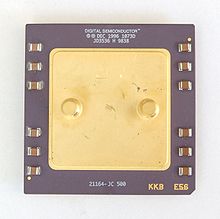Definition of Alpha Platform in Network Encyclopedia.
What is Alpha platform?
A computer platform whose processor is based on the DEC Alpha RISC architecture microprocessor. Alpha is one of two processor platforms supported by Microsoft Windows NT (the other being Intel’s x86 platform).

Alpha-based systems, which are used primarily for high-performance servers and workstations, can run operating systems such as Windows NT, Digital UNIX, and OpenVMS.
Alpha 21164 Processor
The Alpha 21164 processor is specifically designed for running Windows NT desktop applications and includes a new set of motion video instructions (MVI) for high-performance multimedia applications. The superscalar design of this processor integrates a 16-KB instruction cache, an 8-KB data cache, and a 96-KB second-level cache and can issue four instructions for each clock cycle.
It uses 0.35-micron CMOS-integrated circuit technology and a fully pipelined 64-bit RISC architecture to provide the highest performance for Windows NT systems. The processor is housed in a 499-pin ceramic package and generates 28 watts of heat when running at 366 MHz. It is designed to work with the AlphaPC 164LX motherboard.
See Alpha 21164 Microprocessor datasheet
Alpha-based systems
The first generation of DEC Alpha-based systems comprised the DEC 3000 AXP series workstations and low-end servers, DEC 4000 AXP series mid-range servers, and DEC 7000 AXP and 10000 AXP series high-end servers. The DEC 3000 AXP systems used the same TURBO channel bus as the previous MIPS-based DECstation models, whereas the 4000 was based on FutureBus+ and the 7000/10000 shared architecture with corresponding VAX models.
DEC also produced a PC-like Alpha workstation with an EISA bus, the DECpc AXP 150 (codename “Jensen”, also known as the DEC 2000 AXP). This was the first Alpha system to support Windows NT. DEC later produced Alpha versions of their Celebris XL and Digital Personal Workstation PC lines, with 21164 processors.
Digital also produced single board computers based on the VMEbus for embedded and industrial use. The first generation included the 21068-based AXPvme 64 and AXPvme 64LC, and the 21066-based AXPvme 160. These were introduced on March 1, 1994. Later models such as the AXPvme 100, AXPvme 166 and AXPvme 230 were based on the 21066A processor, while the Alpha VME 4/224 and Alpha VME 4/288 were based on the 21064A processor. The last models, the Alpha VME 5/352 and Alpha VME 5/480, were based on the 21164 processor.
The 21066 chip was used in the DEC Multia VX40/41/42 compact workstation and the ALPHAbook 1 laptop from Tadpole Technology.
In 1994, DEC launched a new range of AlphaStation and AlphaServer systems. These used 21064 or 21164 processors and introduced the PCI bus, VGA-compatible frame buffers, and PS/2-style keyboards and mice. The AlphaServer 8000 series superseded the DEC 7000/10000 AXP and also employed XMI and FutureBus+ buses.
The AlphaStation XP1000 was the first workstation based on the 21264 processor. Later AlphaServer/Station models based on the 21264 were categorized into DS (departmental server), ES (enterprise server) or GS (global server) families.
The final 21364 chip was used in the AlphaServer ES47, ES80, and GS1280 models and the AlphaStation ES47.